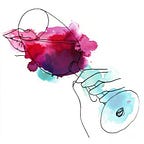A Japanese on the street
There was an old Japanese gentleman on the street I had lived. He was short and a little stooped, wandered around always with a pair of slippers and a brown velvet bag hanging on one of his shoulders. Inside the bag was a wooden chess set with a folding board, everyone in our neighborhood was aware of that. He accosted whoever looked unoccupied to play chess with him. His Chinese was broken, just enough to communicate the basic ideas. But he was polite, probably too polite to be taken seriously.
I grew up in Changchun, the city had once been the capital of Manchukuo, a Japan-controlled puppet state in China before and during WW2. There were remains and traces of the Japanese occupation everywhere around us, the imperial palace built for the last Qing emperor at the northeast part of the town where I had never visited, the buildings with mixed Chinese and European style along the Freedom Boulevard and the New People Boulevard that had been mapped out for the Eight Major Bureaus of Manchukuo, the paved streets with shady elms across the city, the tramcars running on rail tracks. The Japanese made the go-around intersections up with small cobblestones of square shapes, just like the ancient streets in Prague or Paris. At the end of the New People Boulevard, it was the new palace that just had the massive foundation laid before the surrender of Japan. The rest of the building was finished in 1950s and became a landmark on a university campus. When I visited my friends’ homes, very likely I might walk into a Japanese style apartment with tatami floor and shoji sliding doors.
Growing up in such an environment, it was strange that I had never had another thought on why we had Japanese people wandering in our neighborhood. Such questions had never entered my mind when I lived in Changchun. I was too young to know much about the brutal war and the infamous invasion. But we did learn history in school. The Sino-Japanese wars were the highlights in our curriculum. But for some reasons our teachers didn’t make any connection between the history they taught and the real life we lived. They never pointed out that Changchun was once a pivotal site during the Japanese occupation, and never even bothered to bring us to the puppet palace for a field trip.
The chess guy to me was just a chess guy who could not speak Chinese well, who giggled like a child whenever somebody agreed to play with him. Actually, he was not the only Japanese there. Across the road from the apartment my family lived, there was a family that had a Japanese wife and a Chinese husband. Unlike the chess guy, you could hardly tell that the wife was a foreigner because she dressed like most Chinese women and spoke fluent Chinese. The couple had a daughter who loved to sing and dance. She became a kindergarten teacher after graduating from high school and moved to Japan with her mother in 1970s when the diplomatic relations were established between China and Japan. The two of them visited back three or four years later with a toddler boy whose remote control toy car attracted the children in our neighborhood. The husband stayed alone in Changchun for quite while and eventually moved to Beijing to join his son from his previous marriage.
I didn’t notice when the chess guy disappeared from the street and had never gotten to know what happened to him. I only heard that he lived with his younger brother who taught Japanese in the university my father worked. The brother seemed having a family, a wife and children, and very busy. We rarely spotted him on the street other than his chess-loving older brother.
Why did we have Japanese men and women lingered in our city? I figured the whole ordeal out only years later. But the individual experiences of war and the vicissitudes of personal emotion became lost stories never told.
